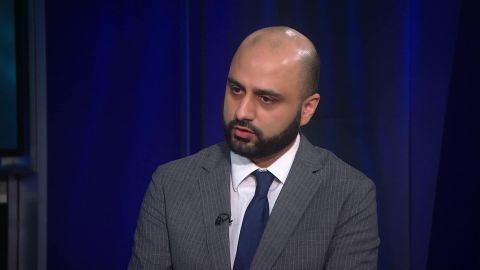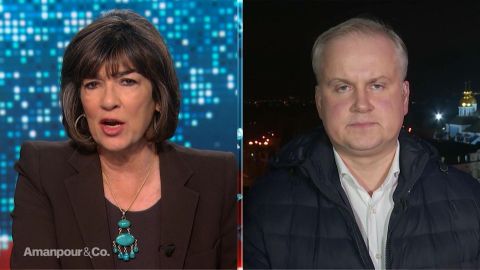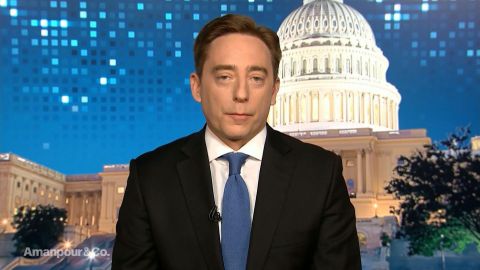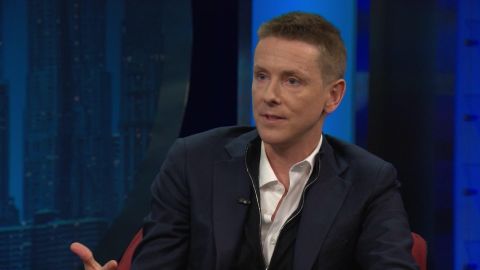Read Transcript EXPAND
CHRISTIANE AMANPOUR: …is Facebook too powerful? It’s a question that is often asked. A growing number of critics think so, including Chris Hughes, who was one of the company’s own co-founders. He left Facebook in 2007 to join Barack Obama’s campaign. And he’s now leading the fight against corporate monopolies, setting him up on a collision course with the company he helped to build. And he told our Hari Sreenivasan how this fight is ultimately about accountability and saving the very foundations of our democracies.
(BEGIN VIDEOTAPE)
HARI SREENIVASAN: So, Chris, you back several different initiatives, one that’s going after monopolies, one that’s doing experiments and learning about models of guaranteed income. You have written in support of a wealth tax. Are all of these different things, are they trying to tackle a larger problem?
CHRIS HUGHES, CO-FOUNDER, FACEBOOK: Yes, we have a belief that the economy has been structured purposefully over the past 30, 40 years to create momentous gains for the 1 percent and for corporations, and make it more difficult for everyday people to make ends meet. We see in the data median wages are flat. Productivity is stalled. Entrepreneurship, maybe counterintuitively for some, is actually at — is near an all-time low.
And so the economy, just on the merits, isn’t working. And I think most Americans get that. And that’s why we’re living in a moment where there’s big calls for structural change.
SREENIVASAN: You have set up a fund to fight monopolies. Tell us a little bit about that and what the intent is.
HUGHES: So, at the Economic Security Project, which is the group that I co-run, we have a $10 million fund to invest in organizations that are taking on concentrated corporate power in whatever form, in tech, but also in other sectors. And it’s our observation that, right now, there are so many individuals. Some of them are organizers and activists. Some are academics and journalists. Some are artists and storytellers. There’s so many people who are saying, hey, wait a second. Our economy is tilted in the wrong direction. Corporations have too much power. And this isn’t just a fluke. This has happened because we haven’t had active anti- monopoly policies in a long time.
And so our fund is there to provide seed capital to these individuals to be able to either begin new work or double down on work that’s already been happening to take on that concentrated corporate power. So, an example is, a group like the Institute for Local Self-Reliance is helping give voice to a lot of the small business owners across the country who have a harder time making ends meet and taking on the big corporate titans. So, a lot of those individuals, those voices aren’t heard a lot in the media or in state capitals or on Capitol Hill. And then there are still others, like the Athena coalition, which is organizing against Amazon. We have a long list that we’re…
(CROSSTALK)
SREENIVASAN: If you’re organizing against Amazon, even if you put in this $10 million fund, and if you’re — if you’re planting these seeds, you’re taking on corporations that are worth hundreds of billions of dollars.
HUGHES: Yes, absolutely.
SREENIVASAN: Right? And that’s — that seems like a…
HUGHES: It’s small, compared to what they’re going to spend. And it’s — I mean, it’s our contention, though, that they may have the money, but we, as a movement, have increasing power.
SREENIVASAN: So, what makes a monopoly unhealthy or dangerous?
HUGHES: So, monopolies are problems for both economic and political reasons. We can take the economic ones first. Look at Amazon. Amazon is right now in a place where it dominates e-commerce and much of commerce in the American economy. And it not only sells stuff directly as a company. It creates a platform for thousands of other sellers to come on Amazon and say, oh, OK, I’m going to use Amazon’s infrastructure to sell my product, whether it’s a diaper, a book, or something that’s handmade. As the platform, Amazon has all of the data about what’s being sold, when, how, to whom, and at what price. And it uses that data to then structure its own first-party decisions about — about what to produce and what to sell. So it just tilts the playing field to favor the incumbent.
And then there’s the political problems. The fewer companies you have, the more power they have and the more that their — their voice is heard in the halls of government, and the more that they’re able to shape policy on their behalf. And so what we have seen, even now, or particularly now, is the growth of this power. And good institutions, like the Department of Justice and the FTC, have, in some cases, taken a step back and not taken on their regulatory duties as a result of this — of this pronounced power.
SREENIVASAN: But what’s the difference between Amazon and, say, a Walmart, before Amazon, where they had a tremendous amount of information, and they knew my buying habits, perhaps? Maybe it wasn’t in the online space, but they were a giant company. And what their promise seems to be to consumers is, we will give you the cheapest product possible — or, I should say, the best price, right?
HUGHES: Well, to be clear, I don’t think there’s anything wrong with prices going down. And, in some cases, as companies grow larger, they — the prices can go down temporarily. But a recent study that just came out a few weeks ago showed that the collection of big monopolies in the United States economy is costing the average American about $5,000 a year that they wouldn’t otherwise have to pay.
SREENIVASAN: How so?
HUGHES: So, you can take mobile telephony as an example. In the United States, we only have a few major carriers. In other places in the world, they have even more. The competition in the marketplace brings down the prices, so that you can pay less on a month-to-month basis. It’s the same thing for cable service, same thing for pharmaceuticals. The average household pays over $1,000 in pharmaceuticals each year. And they use their monopoly power to protect those profits. So it adds up across these different parts of the economy. But, again, prices are not just the only problem. You also see a decrease in quality. Facebook is a good example of this. Facebook is technically a free product for most people to use. But because Facebook has gotten so big, all of these privacy scandals that keep happening seem to be because there’s no other — there’s no other real social network to compete. So, prices go up, quality goes down, and the corporations have an outsized voice in the policy-making process.
SREENIVASAN: Do you think that companies have more power than government does now?
HUGHES: It depends on the sector and it depends on the context. In some cases, they — in some cases, they do, and others not. I mean, the power of Facebook is a good example over political speech Right now, Mark Zuckerberg — and really just Mark — is making really formative, important decisions about verification of ads on Facebook.
SREENIVASAN: Whether or not they’re going to verify a political ad, right?
HUGHES: Exactly, whether or not the — Facebook is going to be responsible for verifying a political ad.
SREENIVASAN: And his position is: No, everybody should be able to say whatever they want, and it is an informed public. They can make up their own minds. We, Facebook, are not going to stand in the way and say that this is true and this is not true.
HUGHES: His — his position is that, that we shouldn’t hold Facebook to the same standards that we hold network television or any of these other companies to, and, whereas others may have a basic standard of decency to ensure that ads are not lying, not propagating outright lies, Facebook is going to have none of it, and is not going to take on this responsibility. That has a huge impact on the political and civic discourse in our — not just in our country, but in other countries as well. And that kind of power is problematic because it is unaccountable.
The board at Facebook is really just an advisory board, because of the way Mark has structured the company. And, until recently, we haven’t seen a lot of regulatory action from the FTC or DOJ or — or government. And so we have one corporate executive in California who’s making really important decisions for our national and civil discourse. And we can and should debate whether that’s the right decision or the wrong decision, but I think that the point that it teaches us is that — that Mark Zuckerberg and Facebook has too much power. And the role of our government is to identify when that power is being abused and to check it.
SREENIVASAN: Just to remind some of our audience, you wrote an op-ed this past year. And in it — I’m just going to read a little excerpt of it — it says: “Mark’s influence is staggering, far beyond that of anyone else in the private sector or in government. He controls three core communications platforms, Facebook, Instagram and WhatsApp, that billions of people use every day. Facebook’s board works more like an advisory committee than an overseer, because Mark controls around 60 percent of voting shares.” You, along with a couple of professors from NYU and Columbia, went down this summer and had conversations with both the FTC and the DOJ about Facebook. What did you tell them?
HUGHES: You know, we talked to them about the same things that I wrote about in the article, that Facebook has specifically pursued a policy of acquiring its competitors in order to lock down the social networking marketplace. There are some competitors out there, like Snapchat or Twitter, but their size is really a rounding error. I mean, Facebook’s revenue this year will be $50 billion. Snap’s last year was one. I mean, these companies, they exist, but they’re — they’re specks compared to Facebook’s size. And so, just as I called for in the piece…
(CROSSTALK)
SREENIVASAN: Yes.
HUGHES: … I do you think that Facebook should be broken up. I think that it should — that WhatsApp, Instagram and Facebook should be separate companies, each with their own CEO, each competing against one another. And I think, at the same time, we also need to think about, what are rules for the road for social networking and other tech companies that can ensure that users are protected even in a more competitive environment? So, these are things like privacy protections, interoperability, data portability, some kind of framework for how we’re going to deal with these questions of political speech, et cetera.
SREENIVASAN: Do you think — there are some reports now that the FTC might be considering injunctions against Facebook in the coming year. Kind of explain, in layman’s terms, what does that mean and what is it about?
HUGHES: They’re saying that they’re seriously considering telling Facebook: Hold up. We need to take a closer look. That’s the basic idea, is that Facebook has been working over the past year to effectively combine the back end frameworks that power Facebook with Instagram and WhatsApp and make them into one single framework. The idea of a preliminary injunction would be to say, pause. Let’s talk about how these companies work. Let’s — let’s assess whether or not the mergers were incorrectly approved by the FTC. And, by the way, it’s not just the FTC. Every branch of government that could be investigating Facebook and some of these other tech companies right now is standing up to do so. So, it’s the FTC. It’s the Department of Justice. It’s the House Antitrust Subcommittee in the House of Representatives. And it’s 47 of the states’ attorneys general all across the country. I mean, and just by the math right there, you see, we have — we have got a Republican administration, and the FTC and DOJ are part of — are part of the executive branch. And about half of those attorneys general are also Republicans. So this is — there’s a bipartisan consensus that we need more oversight here. And I think it’s overdue.
SREENIVASAN: Look, I could see these companies coming back and saying, listen, we have literally billions of happy customers. What’s the problem? Yes, there’s political ads, and there’s political interference. This is taking up a huge amount of mindshare, but, on a daily basis, Facebook can say, I have got a couple of billion humans that are using our products and services, relatively happy with it. Amazon can say, I am half all of e-commerce in America. Most people are pretty happy with their boxes showing up in two hours or two days.
HUGHES: Yes, I think that — well, it depends on — it depends on the public opinion research. There’s plenty of people who aren’t very happy with Facebook in particular these days.
SREENIVASAN: Sure.
HUGHES: Amazon is a more popular company. And we could go from company to company. And I think that the point is not to pick on any particular one company just because people don’t like it.
SREENIVASAN: Yes.
HUGHES: Like, that’s not the problem. The problem is to identify when companies — or the challenge is to identify when companies have become problematic, when they have become too big and have used that power in ways that decrease quality or increase prices. Then that’s when — or decrease wages. That’s when government should step in.
SREENIVASAN: In Facebook’s case, Mark Zuckerberg’s response has always been, listen, breaking up the company isn’t going to solve the problem. You know, these large companies are the only ones that actually have the ability to tackle the problems at scale. Facebook is the only one that can hire thousands of content moderators and keep ad libraries and all this other stuff going. So, even if you said, OK, WhatsApp is a separate company, and Instagram is a separate company, and Facebook Messenger is part of a separate company, you’re not going to fix it.
HUGHES: Yes, I mean, what we’re talking about, even in a scenario where the WhatsApp and Instagram acquisitions are unwound, is still three very large companies, not the size of today’s, but with billions of dollars of revenue and significant resources both to police their platforms and to ensure that their users are protected. And it’s my view and the view of a lot of economists that Facebook broken up into three would create more competition and, in the long term, probably more — more profits for investors.
SREENIVASAN: Yes.
HUGHES: I mean, this is what you see in the case of AT&T after its structural separation , or the case of Standard Oil, is that it turns out competition leads towards economic growth, like, so what we all feel intuitively.
SREENIVASAN: Are you concerned, heading into the 2020 election, that it’ll be just a repeat of the 2016 elections in terms of social platforms being manipulated in the process?
HUGHES: I am. I am concerned about it.
SREENIVASAN: Do you think we have done enough to safeguard ourselves? I mean, I know you’re not at Facebook. You left quite some time ago, but…
HUGHES: I don’t think so. I think — I think there’s a lot more that can be done. I think one of the most obvious things is, I do think that Facebook has a responsibility to not allow outright lies in political advertising.
SREENIVASAN: Yes.
HUGHES: I have said this, and many other people have said this. I think Facebook in particular has a responsibility to be even more aggressive in deactivating fake accounts, because we know that the fake accounts are a big way that folks trying to manipulate these elections are spurring the content along. And I think there are other things that they could do that would be helpful as well. I think you could charge political advertisers the same rates for their ads, regardless of whether or not the ads go viral. I mean, this seems like a very technical point, but just to illustrate it, if you look at the 2016 election, Trump was paying one-16th of what Hillary Clinton’s campaign was — was paying for their ads, because the way that the Facebook ad platform is structured is, if you pay for an ad that is provocative, and people want to share it, and it goes viral, it’s cheaper on a per-impression basis than it is otherwise.
And then, finally, I also think that they should be thinking about how to ensure that, putting the ads aside, the political content on the platform that is reaching big, large audiences is — is reviewed by some humans to ensure that it’s not an outright lie or misleading.
SREENIVASAN: Yes.
(CROSSTALK)
HUGHES: I mean, the — a few months ago with Nancy Pelosi, that was — that was a faked video where it seemed like she was — she was drunk, even though she doesn’t drink alcohol, is a perfect example.
SREENIVASAN: Yes.
HUGHES: And Facebook not only allowed that to stay on the platform, but, because of the way they design the News Feed algorithm, it gets distributed very far and wide. And that — that’s a choice that they’re making.
SREENIVASAN: You guys were roommates. You co-founded this thing. You were friends. What motivates him?
HUGHES: I think, these days, it’s — these days, I think he and the Facebook leadership, I mean, they’re — I think they’re trying to do the right thing. I — I do disagree with a lot of the decisions that they have made.
SREENIVASAN: How have you seen…
HUGHES: But I think it’s not — I think it’s important to — for me to say that — because I have been friends with Mark and other people in the Facebook leadership for a long time, that this is not personal for me. I don’t have a vendetta out for him or for Facebook. In general, I think that I do have a responsibility, as a co-founder of the company, to speak up, and specifically when the problems that we’re talking about here are so big and are so significant, I mean, when you’re talking about not just political discourse in our country, but next year’s election and the economic power of one of the largest companies in the country and in the world. And, at a certain point, that responsibility is something that I feel has, you know, caused me to need to speak out.
SREENIVASAN: Chris Hughes, thanks so much for your time.
HUGHES: Thanks for having me.
About This Episode EXPAND
Christiane Amanpour speaks with Iran researcher Mohammad Ali Shabani to break down what’s happening there. She also talks to former Ukranian Deputy Foreign Minister Danylo Lubkivsky about the country’s place in current events; and New Yorker writer Evan Osnos about U.S.-China relations. Hari Sreenivasan chats with Facebook co-founder Chris Hughes about his fight against corporate monopolies.
LEARN MORE



